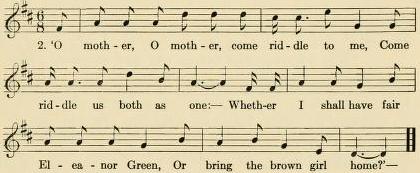Lord Thomas & Fair Eleanor- Blacknall (NC) c.1812; Brown M
[My title. From Brown Collection of NC Folklore; 1952. Their notes follow.
R. Matteson 2012, 2014]
Lord Thomas and Fair Annet (Child 73)
Of all the old ballads, this probably stands next to 'Barbara Allan' in popular favor. For its range in living tradition, both the old country and in America, see BSM 37-8 and add Tennessee (SFLQ XI 122-3), North Carolina (FSRA 23-4), Florida (SFLQ
VIII 147-50), Arkansas (OFS i 99-101, 106-8), Missouri (OFS 1 94-9, 1 01 -6), Ohio (BSO 29-34), Indiana (BSI 58-70), Illinois (JAFL Lii 75-6), and Michigan (BSSM 37-9). American texts follow one general pattern with various differences in detail — mostly cases of leaving out or putting in. Of the fourteen texts in the Brown Collection only a few are here given in full.
M. 'Lord Thomas and Fair Eleanor.' Reported by Mrs. R. D. Blacknall of Durham as "sung by an elderly seamstress in my great-grandfather's family between 1812 and 1820." The longest of all the North Carolina texts, and interesting by reason of its divergencies from customary readings. It is difficult, in the customary versions, to reconcile Eleanor's sumptuous array and equipment with her status as dowerless girl, it is still more so when we have her presented as the only daughter of the king's high dame.
1 Lord Thomas, Lord Thomas he was a brave man ;
He courted the king's high dame.
She had but one own fair daughter —
Fair Eleanor was her name.
2 'O mother, O mother, come riddle to me,
And riddle us both as one,
And say shall I marry the fair Eleanor
Or bring the brown girl home?'
3 'The brown girl she hath both house and lands,
Fair Eleanor hath none.
So I would advise you with all of my mind
To bring the brown girl home.'
4 He clad himself in velvet fine.
His waiters all in white;
And every town that they passed through
They took him to be some knight.
5 He rode and he rode till he came to the castle ;
He made the knocker to ring.
There was none so ready as the fair Eleanor
To rise and let him in.
6 'What news, what news. Lord Thomas?' she cried,
'What news do you bring to me?'
'I come to invite you to my wedding.
Tomorrow it is to be.'
7 'Bad news, bad news, Lord Thomas,' she cried,
'Bad news do you bring to me.
I thought to have been myself your bride
And you bridegroom to me.
8 'O mother, O mother, come riddle to me,
And riddle us both as one.
And say shall I go to Lord Thomas's wedding
Or tarry alone at home?'
9 'There are many that are our friends, daughter,
But thousands are our foes.
So I would advise you with all of my mind
To Lord Thomas's wedding don't go.'
10 'There are many that are our friends, mother,
Though thousands be our foes.
So, betide me life, betide me death,
To Lord Thomas's wedding Til go!'
11 She clad herself in satin fine,
Her maidens all in green,
And every town that she passed through
They took her to be some queen.
12 She rode and she rode till she came to the hall;
She made the knocker to ring.
There was none so ready as Lord Thomas himself
To rise and let her in.
13 He took her by her lily-white hand.
He led her through the hall,
He led her into an upper room
Where sat the ladies all.
14 'Is this your bride. Lord Thomas?' she cried,
'Methinks she looks wondrous brown,
When you might have had so fair a lady
As ever the sun shone on!'
15 'Oh, speak no ill,' Lord Thomas said,
'Oh, speak no ill of she;
For I do love your little finger more
Than I do her whole body.'
16 The brown girl she had a little pen-knife,
And it was keen as a dart;
And between the short ribs and the long
She pierced fair Eleanor's heart.
17 'Oh, you are blind, Lord Thomas,' she cried,
'Or can't you very well see?
Oh, don't you see my young heart's blood
Come trickling down to my knee?'
18 Lord Thomas he had a sword by his side.
And it was sharp and small;
And with it he cut off the brown girl's head
And he flung it against the wall.
19 'Oh. dig my grave, oh, dig my grave,
And dig it wide and deep.
Bury fair Eleanor in my arms,
The brown girl at my feet.'
20 He placed the hilt upon the ground,
The point against his heart.
Did ever three lovers meet together
So very soon to part?
---------------------
M. 'Lord Thomas and Fair Eleanor.' Sung by anonymous female singer. Contributed by Mrs. R. D. Blacknall of Durham: catalogue gives 1921? This version is melodically related to that of Horton Barker. These two songs share in a melodic idiom (measure 2) which in songs of the same name occurs likewise in only two versions. The idiom is known by the popular term 'Scotch snap' otherwise known as alia lombardo. The two songs in the Sharp collection can be found in SharpK i 121-25, Nos. 19 J and Q. Our tune has in common with the Miller version, Ex, another melodic peculiarity, a downward skip of a sixth. While this skip is found in only two of our versions, in Sharp's collection it occurs quite frequently, although in different measures. Cf. SharpK i 115-31, Nos. 19 A, C, D, F, G, I, J, S, and Ee.

For melodic relationship cf. **SharpK I 125, No. 19P, measures 3-4 and 7-8, and No. 19H, measures i and 3-4; Also TBV 569, No. 18 (D) II. *BSSM 37. No. 4.
Scale : Heptachordal. Tonal Center: d. Possibly mm1n (2,2,4) = barform. Structure: aa1bc (2,2,2,2) = ab (4,4).